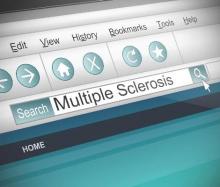Patients with multiple sclerosis who recovered slowly from an early relapse developed progressive disease symptoms earlier than did those who recovered more quickly in a study of two MS patient cohorts, according to Dr. Martina Novotna and her associates.
The study involved a population-based cohort comprising 105 patients with relapsing-remitting MS and 86 with bout-onset progressive MS, defined as those with single-attack progressive or secondary progressive MS, and a clinic-based cohort of 415 patients with bout-onset progressive MS. Patients with primary progressive MS were excluded.
During the first 5 years after MS onset, about 80% of patients in the population-based cohort had good recovery (complete to almost-complete recovery based on patient-reported and examination-confirmed outcome measured at least 6 months post relapse), while about 16% had poor recovery. Among patients with a good recovery, half developed progressive MS 30.2 years after onset of MS, whereas half of those with a poor recovery had developed progressive symptoms only 8.3 years after MS onset.
In the clinic-based cohort, patients with good recovery developed progressive disease a mean of 4.7 years later than did those with poor recovery. Fulminant initial relapse was the most significant risk factor for poor recovery. Older age also put the patient at higher risk for a poor recovery from an early MS relapse, as did brainstem, cerebellar, or spinal cord involvement.
“Although multiple early relapses portend a worse prognosis than a single relapse [did], we found that even a single relapse associated with poor recovery may lead to rapid onset of progressive MS,” the investigators noted.
Find the full study in Neurology (doi:10.1212/WNL.0000000000001856).


